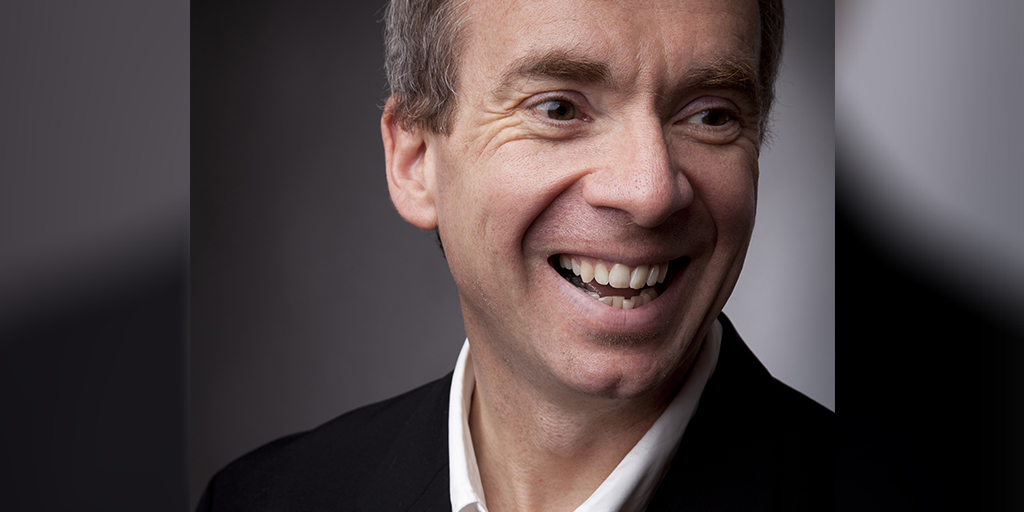British tenor James Gilchrist made his Tafelmusik debut in our 2015/16 season in Bach Christmas Oratorio. We are thrilled to welcome James back this season as he takes on the role of the Evangelist in Bach St Matthew Passion. Get to know James here with his personal biography.
At the age of eight I came home from school one day and informed my parents that I was now in the local church choir, and needed to be at rehearsal every Thursday, and morning service every Sunday, thank you very much. If my parents were surprised or even annoyed, they hid it well. Our family was always surrounded by music, and I think I just assumed it was a normal thing to do. From then on, much of my vocal training has been in church choirs. I was lucky enough to sing in the choir of New College, Oxford as a boy treble, and as a tenor in that of King’s Cambridge. I think, though, that I never dreamt that I might one day earn my living through singing. It was just part of normal life – another straightforward way to communicate. Indeed, if anyone had asked me then what sort of a musician I was, I’m sure I would have (forgetting the self-derogatory terms) put my cello playing first. But I have come to realise that it’s the unique fusion of words and music that is singing that moves me beyond measure, and makes singing the essence of my musical self.
But, I wanted to be a doctor. Not in a half-hearted way, but truly as a vocation, and it is only really by accident that I find myself not in medicine, but in the arts. I trained in the London Hospital, Whitechapel, very much using my singing in professional choirs both as a way of keeping me sane, but also to give me something to live off. And so, while studying and working in medicine, I sang in groups such as the Sixteen, the Tallis scholars and the Cardinall’s Musick, alongside appearing regularly in choral societies up and down the country as their tenor soloist. In retrospect, this was a wonderful training. I was learning huge quantities of repertoire, learning the importance of looking after one’s voice, and also how life was as a professional musician, while having the luxury of knowing that my life wasn’t on the line if it all went wrong.
So when I found my diary rather full of solo engagements, and having completed (and by some miracle passed) yet more medical exams (my MRCP), I went along to my consultant at the time to ask his advice. I must confess that I was terrified. He was a very well-respected nephrologist, and the job much sought-after, and I was wondering whether I might possibly have a month off. But his encouragement was immediate and whole-hearted. Go and try your hand in music and come back in a month to see how it feels. And a month has so far stretched to ten years, and I don’t think I have any regrets.
I do miss medicine, though. It’s not the sort of thing one goes into on a whim. I miss the academic challenge, the excitement of the diagnostic process, the sense of being in a team of so many different disciplines, the enormous privilege of being so intimately involved in people’s lives, and above all else the sense that one is doing something which is so manifestly useful and beneficial to your fellow human-beings. Of course, there are things I don’t miss. Not being one’s own boss, and working always to timetables and rotas. And, tellingly, the responsibility of knowing if you make a mistake that it might be someone else whose life is spoiled. I think I have found a way of life that suits me better now – I’m very much myself on stage. But I miss hospitals, and I and my family very much miss me not having a “normal” job, and having so many weekends away from home.
I was once accosted by someone after a concert in Aldeburgh, who told me I wouldn’t remember him (he was not quite right, but I certainly couldn’t place him), and telling me that he used to tell me off for humming during his operations when I was a student of surgery, and now look – he’s having to fork out a fortune to hear me! He was delighted to do so, of course, and it was an important lesson for me about why music is so valuable to us all. I believe the arts are in some profound way essential to all of us. Artistic expression and endeavour are what makes us human, and the most visceral and basic of our modes of communication. It’s glib to call music the medicine of the soul, but I think there’s some truth in that.
Listen to James perform in Bach St Matthew Passion with the English Baroque Soloists and the Monteverdi Choir, conducted by John Elliott Gardiner. Click on the video below.
Image credit: James Gilchrist by Patrick Allen. James Gilchrist's informal biography courtesty of jamesgilchrist.co.uk.

